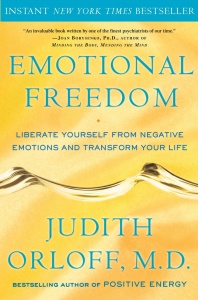Do you have an energy vampire in your life? Get the “Energy Vampire Survival Guide” PDF here.
Some of our family, friends and co-workers will make you feel positive and elevate your mood. Others will suck optimism and serenity right out of you. Vampires do more
SIGNS THAT YOU’VE ENCOUNTERED AN EMOTIONAL VAMPIRE
(from “Emotional Freedom” by Judith Orloff MD)
TYPES OF EMOTIONAL VAMPIRES
Vampire #1: The Narcissist
Their motto is “Me first.” Everything is all about them. They have a grandiose sense of self-importance and entitlement, hog attention, and crave admiration. They’re dangerous because they lack empathy and have a limited capacity for unconditional love. If you don’t do things their way, they become punishing, withholding, or cold.
How to Protect Your Emotions: Keep your expectations realistic. These are emotionally limited people. Try not to fall in love with one or expect them to be selfless or love without strings attached. Never make your self-worth dependent on them or confide your deepest feelings to someone who won’t cherish them. To successfully communicate, the hard truth is that you must show how something will be to their benefit. Though it’s better not to have to contend with this tedious ego stroking, if the relationship is unavoidable use the above strategies to achieved desired results.
Vampire #2: The Victim
These vampires grate on you with their “poor-me’ attitude and are allergic to taking responsibility for their actions. The world is always against them, the reason for their unhappiness. When you offer a solution to their problems they always say, “Yes, but.” You might end up screening your calls or purposely avoid them. As a friend, you may want to help but their tales of woe overwhelm you.
How to Protect Your Emotions: Set kind but firm limits. Listen briefly and tell a friend or relative, “I love you but I can only listen for a few minutes unless you want to discuss solutions. Then I’d be thrilled to brainstorm with you.” With a coworker, listen briefly, sympathize by saying, “I’ll keep good thought for things to work out. Then say, I hope you understand, but I’m on deadline and must go back to work. Then use “this isn’t a good time” body language such as crossing your arms and breaking eye contact to help set these healthy limits.
Vampire #3: The Controller
These people obsessively try to control you and dictate what you’re supposed to be and feel. They have an opinion about everything. They’ll control you by invalidating your emotions if they don’t fit into their rulebook. They often start sentences with “You know what you need?” and then proceed to tell you. You end up feeling dominated, demeaned, or put down.
How to Protect Your Emotions: The secret to success is never try and control a controller. Be healthily assertive, but don’t tell them what to do. You can say, “I value your advice but really need to work through this myself.” Be confident but don’t play the victim or sweat the small stuff. Focus on high priority issues rather than on putting the cap on the toothpaste.
Vampire #4: The Splitter or Borderline Personality
Splitters see things as either good or bad and have love/hate relationships. One minute they idealize you, the next you’re the enemy if you upset them. They have a sixth sense for knowing how to pit people against each another and will retaliate if they feel you have wronged them. They are people who are fundamentally damaged—inwardly they feel as if they don’t exist and become alive when they get angry. They’ll keep you on an emotional rollercoaster and you may walk on eggshells to avoid their anger.
How to Protect Your Emotions: Stay calm. Don’t react when your buttons get pushed. Splitters feed off of anger. They respond best to structure and limit setting. If one goes into a rage, tell the person, “I’m leaving until you get calmer. Then we can talk.” Refuse to take sides when he or she tries to turn you against someone else. With family members, it’s best to show a united front and not let a splitter’s venomous opinions poison your relationships.
Adapted from Dr. Judith Orloff’s NY Times bestseller Emotional Freedom: Liberate Yourself From Negative Emotions and Transform Your Life (Three Rivers Press, 2011)




Hi Judith,
I’m currently working through your online course about survival guide for empaths.
It’s really interesting hearing your perspective and attitude toward people with borderline personality disorder.
My sister has been diagnosed with BPD. Which has been challenging to interact with as a empath. But we have a great relationship and she is deeply self reflective, she is an empath, intelligent, has vivid dreams. I’ve heard that in some culture people with BPD would have been trained as spiritual healers or “sacred clowns”.
Do you have any thoughts or perspectives on this? I would love to find some resources to help my sister on her spiritual journeys so she can give back to the world as she deeply wants to. BPD is recognised as a treatable condition and people who are aware of their issues and seek assistance can successfully heal their BPD diagnosis.
It would also be great to have a resource in your words about how self aware BPD individuals can heal and be spiritual guides for us in this world.
With love,
Gemma
The 7 emotional triggers for empaths was a haha moments for me. I was slightly aware of them throughout my life but never quite acknowledged them until this moment in time in my life. I checked for all of them!!! Awareness and acknowledgement are key!!
Thank you
Rabiath